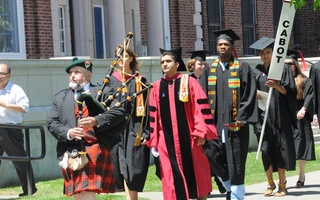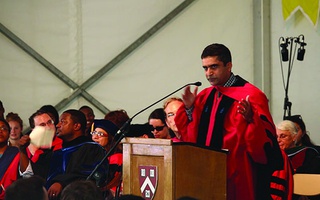
Associate Professor of Psychology Joshua Greene, Professor of Slavic Languages and Literature Stephanie Sandler, and Interim Dean of the College Donald H. Pfister listen to Cabot House Co-Master Rakesh Khurana discuss the culture of academic integrity. The panel, titled "Doing Good Work in a Noisy, Messy World," was moderated by Dean of Undergraduate Education Jay M. Harris, who is also Chair of the Academic Integrity Committee.
Cabot House Co-Master Rakesh Khurana, who will assume the position of Dean of the College this summer, will bring leadership expertise from Harvard Business School and insider experience of House life to one of the University’s highest offices, colleagues and students say.
Born in India and raised in Queens, Khurana will be the first dean of the College who is of Indian descent when he officially takes the post on July 1, more than a year after former dean Evelynn M. Hammonds announced she would resign. His expected deanship comes after two decades at Harvard, where Khurana has filled a number of roles ranging from student to professor to House master—and now, the College’s top administrator.
A professor with a joint-appointment at the Business School and the Faculty of Arts and Sciences, he took the reins of Cabot House with his wife, Stephanie R. Khurana, in 2010, approaching the role with an entrepreneurial mindset. Since then, Khurana’s campus profile has grown as he has voiced his opinion both formally and informally on hot-button College issues such as alcohol policy, academic integrity, and Greek life.
Now, a scholar known for his work on leadership and organizational management will be leading Harvard’s flagship school.
Students across the Charles River in Allston describe Khurana as a compassionate instructor devoted to all aspects of student life, while colleagues, who say that the professor possesses commendable leadership skills, say that they expect him to shape life at College for the better, even as his goals remain unknown.
PRACTICING WHAT HE TEACHES
The incoming dean will arrive at the first floor of University Hall as a seasoned academic who has established a career through sociology-driven research on leadership practices and organizational management, studying and teaching skills that may prove useful in his new job.
Majoring in economics and industrial labor relations at Cornell University, Khurana headed to Harvard after college, earning a Master’s degree in sociology at the University in 1997 and a Ph.D. in organizational behavior a year later. Following a short stint as an assistant professor of management at MIT, Khurana accepted a teaching position at Harvard Business School in 2000. He taught in the school’s business administration program and became a tenured professor in 2008.
Joseph L. Bower, a professor at the Business School who has known Khurana since he was a Ph.D. student, said he expects that Khurana’s scholarship will inform him in his new role.
“When you build courses on leadership, what you’re trying to do is help people think through what it means to work with other people and get them to work together to accomplish something,” Bower said.
Khurana has published books and journal articles on various topics, including the theoretical basis for leadership studies and the pitfalls of charismatic leadership in the corporate world. He serves as the course chair for the Leadership and Organizational Behavior course at the Business School that is required of all first-year students.
“It's interesting that he not only teaches leadership, but he practices it too,” said Ranjay Gulati, the unit head of the Business School’s Organizational Behavior Department in which Khurana is a faculty member. “His work really spans theory and practice really makes him an exceptional person for the position he has been put in.”
Winthrop House tutor Sanjey Sivanesan, who took one of Khurana’s courses last semester, said that in class, Khurana emphasized that effective leadership requires an understanding of organizational culture.
“The biggest takeaway was just that the culture is really really important,” he said, adding that Khurana stressed that “setting the tone from the top is what dictates how organizations are run.”
Read more in College News
Cabot Residents Praise Their House Master, The Next Dean of the College















